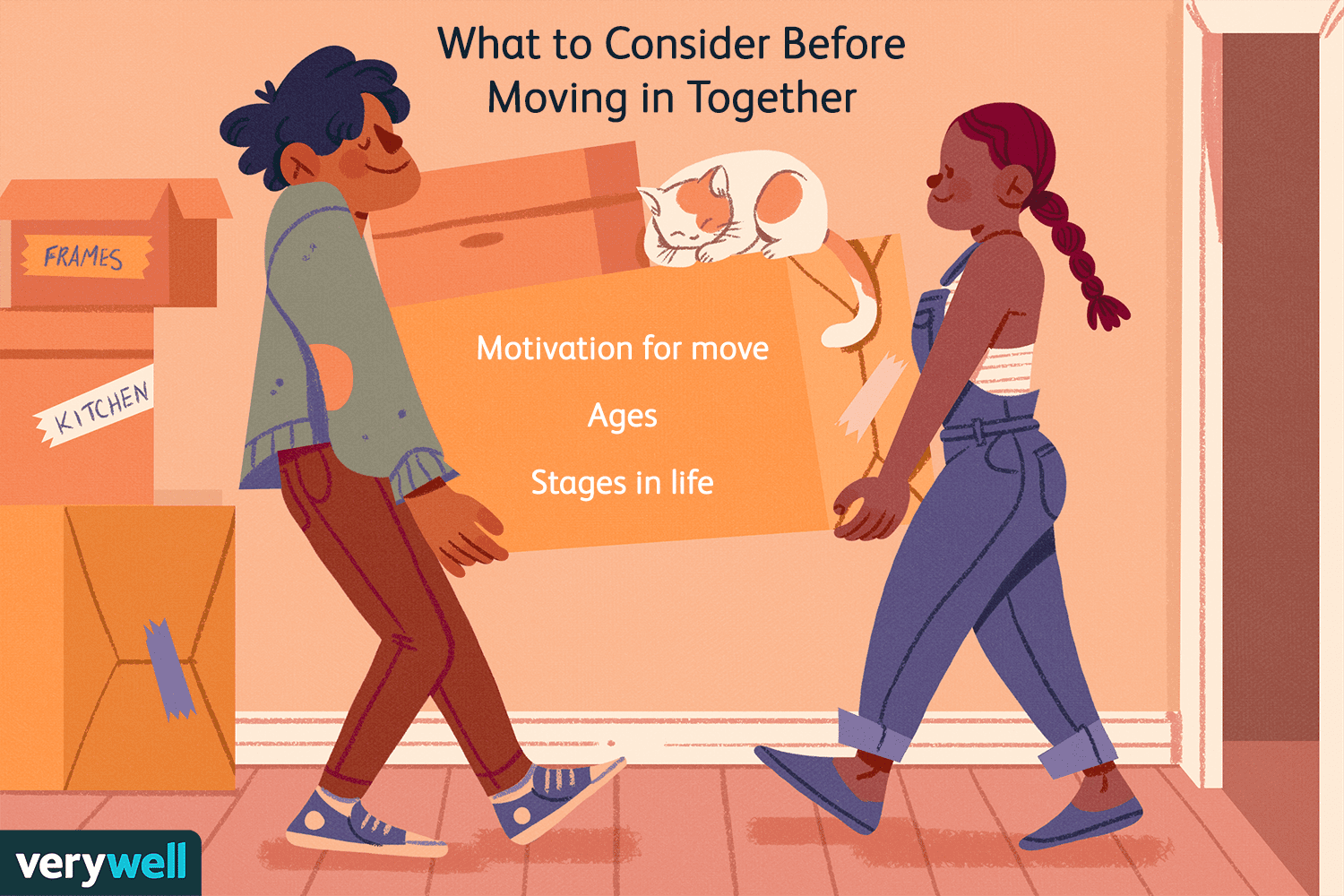
Are you at a crossroads in your relationship, wondering whether or not to take the leap into cohabitation? The decision of whether or not to live together before marriage is a common dilemma faced by many couples. On one hand, the idea of sharing a living space and getting a taste of what married life might be like can seem enticing, while on the other hand, the potential risks and drawbacks may make you hesitate. In this article, we will explore the pros and cons of living together before tying the knot, helping you navigate this decision with clarity and confidence.
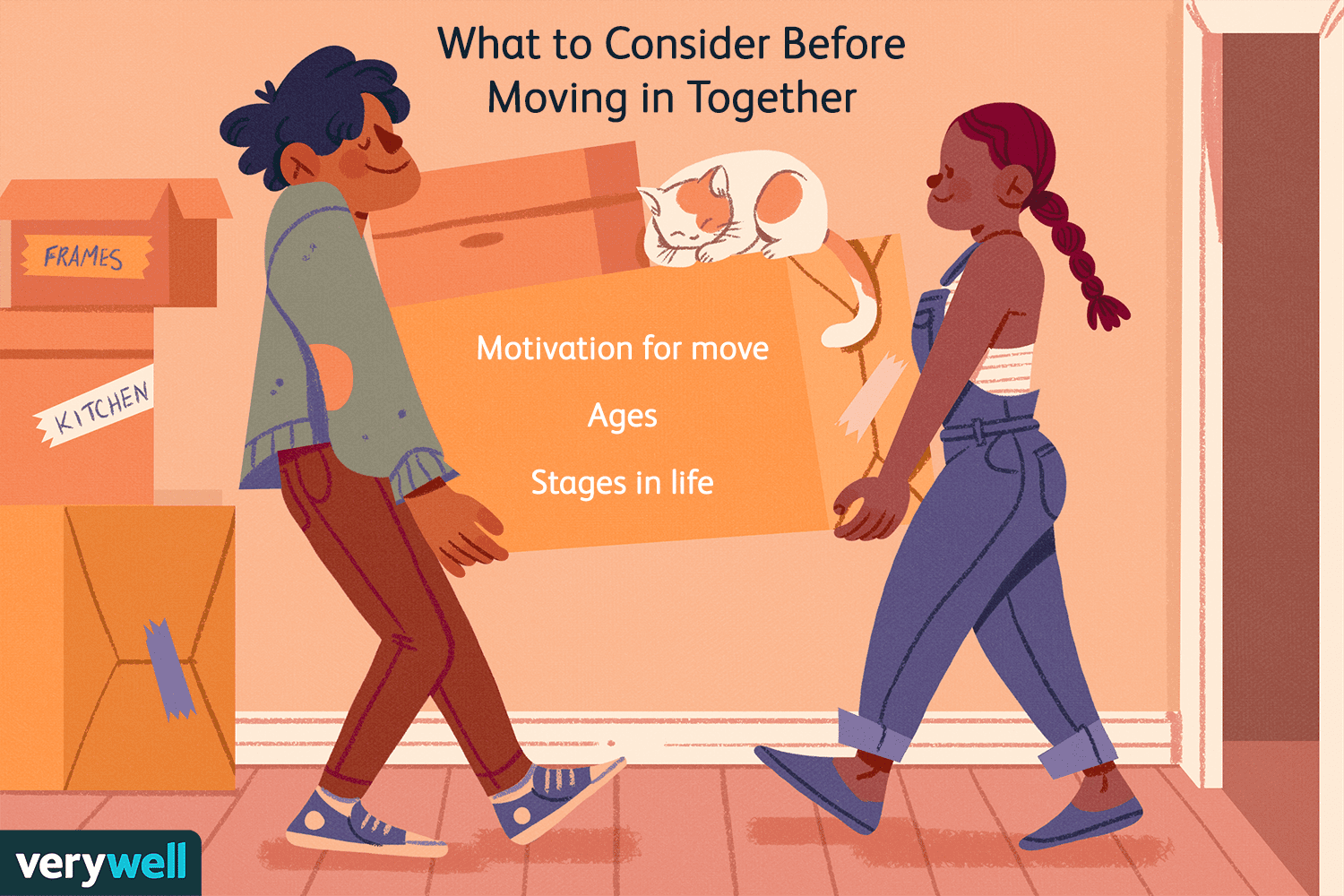
This image is property of www.verywellmind.com.
Exploring the Benefits of Living Together Before Marriage
Building a Stronger Relationship
Living together before marriage can be a valuable experience for couples looking to build a stronger foundation for their relationship. Sharing a home allows you to spend more time together, deepen your connection, and strengthen your bond. Through the day-to-day interactions and shared responsibilities, you can truly get to know each other on a deeper level.
Learning Each Other’s Habits and Preferences
Living together provides an opportunity to learn about each other’s habits and preferences. You can observe how your partner lives, sleeps, eats, and organizes their daily routines. This insight allows you to better understand each other’s lifestyle choices and adapt to one another’s needs and preferences.
Practicing Conflict Resolution
Conflict is an inevitable part of any relationship. Living together allows you to practice and develop effective conflict resolution skills. When disagreements arise, you have the opportunity to work through challenging situations, learn how to compromise, and find solutions that work for both partners. This can be invaluable in preparing you for the challenges that may arise in your future marriage.
Improving Communication Skills
Living together provides ample opportunities for open and honest communication. You will have the chance to express your thoughts, feelings, and needs on a daily basis. This constant communication fosters a deeper understanding of each other and helps to improve your communication skills as a couple. Effective communication is crucial for a successful and fulfilling marriage.
Evaluating Compatibility
Living together before marriage allows you to assess your compatibility as a couple. You can observe how well you function together in various aspects of daily life, such as household chores, decision-making, and problem-solving. This firsthand experience can help you determine whether you are truly compatible in the long run and if marriage is the right step for your relationship.
Determining Financial Compatibility
Finances can be a major source of conflict in a relationship. Living together provides an opportunity to determine your financial compatibility as a couple. You can discuss and establish shared financial goals, create a budget, and manage expenses together. This experience gives you insights into each other’s financial habits, values, and attitudes, helping you make informed decisions about your future together.
Understanding Shared Responsibilities
Living together gives you a firsthand understanding of what it means to share responsibilities. You can learn how to divide household chores, manage daily tasks, and make joint decisions. This experience helps you develop a sense of teamwork and cooperation, which are essential for a successful marriage.
Discovering Household Roles and Chores
Living together provides a chance to discover household roles and chores that work best for both partners. You can experiment with different arrangements and find a division of labor that feels fair and equitable for both of you. This process of discovery allows for open communication and negotiation, leading to a more harmonious and balanced home life.
Assessing Sexual Compatibility
Sexual compatibility is an important aspect of any romantic relationship. Living together before marriage allows you to explore and assess your sexual compatibility. You can have more frequent and intimate moments together, which can help you understand each other’s desires, preferences, and boundaries. This experience can enhance your sexual relationship and lead to a more fulfilling and satisfying married life.
Testing the Waters of Shared Living
Living together before marriage serves as a trial period for shared living. It gives you the opportunity to see how well you function as a couple on a day-to-day basis. It’s a chance to experience the realities of living together, such as managing finances, sharing space, and resolving conflicts. This trial period can provide valuable insights into the dynamics of your relationship and help you make an informed decision about your future together.
Considering the Drawbacks of Living Together Before Marriage
Potential Loss of Excitement and Novelty
One potential drawback of living together before marriage is the potential loss of excitement and novelty. Some couples may feel that the thrill of marriage is diminished when they have already experienced the day-to-day realities of living together. It’s important to consider whether this loss of novelty is outweighed by the benefits of shared living.
Creating a Sense of ‘Trial Marriage’
Living together before marriage can create a sense of a “trial marriage.” This can lead to a more casual approach to commitment, as couples may feel that they can easily end the relationship if things don’t work out. It’s important to approach cohabitation with a mindset of commitment and readiness for marriage, rather than treating it as a temporary arrangement.
Increased Pressure and Expectations
Living together before marriage can sometimes increase pressure and expectations within the relationship. Friends, family, and society may have higher expectations for a couple who is living together, leading to added pressure for marriage. It’s important for couples to prioritize their own desires and timelines, rather than succumbing to external pressures.
Reducing the Desire for Marriage
In some cases, living together before marriage can reduce the desire for marriage. Couples may feel that they have already experienced the benefits and challenges of married life, leading them to question the necessity of formalizing their relationship through marriage. It’s important to have open and honest conversations about your long-term goals and desires as a couple.
Risk of Relationship Breakdown
Living together before marriage does carry a risk of relationship breakdown. While it can provide valuable insights and experiences, it can also expose potential incompatibilities and conflicts that may lead to the end of the relationship. It’s essential to approach cohabitation with openness and a willingness to address and work through any challenges that arise.
Difficulties in Disentangling Finances and Assets
When couples live together before marriage, they may intertwine their finances and assets without the legal protections that come with marriage. This can create difficulties and complexities if the relationship ends. It’s important to consider the potential challenges of disentangling finances and assets if the relationship doesn’t work out and to seek legal advice if necessary.
Social and Cultural Stigma
Living together before marriage can still be met with social and cultural stigma in some communities. Some individuals may face judgment or disapproval from family, friends, or their wider social circle. It’s important to consider how comfortable you are with potential stigma and to prioritize your own values and beliefs above societal expectations.
Challenges in Ending the Relationship
If a couple decides to end their relationship after living together, they may face additional challenges compared to a non-cohabitating couple. There may be shared financial responsibilities, joint leases or mortgages, and shared possessions that need to be addressed during a breakup. It’s important to be prepared for the potential challenges and to have open and honest conversations about expectations and responsibilities.
Concerns about Commitment
Some may argue that living together before marriage raises concerns about commitment. If a couple opts for cohabitation instead of marriage, there may be questions about their level of commitment to the relationship. It’s important for couples to openly discuss their intentions, expectations, and commitment levels to ensure they are on the same page.
Examining Cultural and Religious Perspectives
Religious Views on Cohabitation
Different religions have varying views on cohabitation before marriage. Some religions may view it as a violation of religious teachings, while others may be more accepting or provide guidelines for living together before marriage. It’s important for individuals to explore and understand their own religious beliefs and consult with their spiritual leaders for guidance.
Traditional Expectations and Norms
Traditional expectations and norms surrounding marriage can also play a role in how cohabitation before marriage is viewed. In some cultures, living together before marriage may be highly discouraged or seen as improper. It’s important for individuals to consider their cultural backgrounds and the expectations of their families and communities.
Impact of Cultural Background
Individuals’ cultural backgrounds can influence their perspectives on cohabitation before marriage. Some cultures may prioritize marriage as the only acceptable form of partnership, while others may be more accepting of alternative arrangements. It’s important to navigate the intersection of cultural background and personal beliefs when making decisions about living together before marriage.
Influence of Family and Social Circle
Family and the wider social circle can have a significant influence on individuals’ decision to live together before marriage. Some families may be supportive and encourage cohabitation, while others may have reservations or specific cultural expectations. It’s important to consider the opinions and values of loved ones while also prioritizing personal autonomy and happiness.
Shifting Attitudes towards Cohabitation
Attitudes towards cohabitation before marriage have been shifting in many societies. What was once seen as taboo or unconventional is now more widely accepted and prevalent. It’s important to recognize and consider the changing social landscape while also evaluating personal beliefs and values.
Exploring Gender Dynamics in Living Together Before Marriage
Women’s Empowerment and Independence
Living together before marriage can promote women’s empowerment and independence. It allows women to explore their role in a partnership, establish their own identity, and maintain their autonomy. It can be an opportunity for women to negotiate their desires and needs within the relationship, fostering a sense of empowerment.
Gender Equality and Sharing Responsibilities
Living together before marriage provides an avenue for fostering gender equality and sharing responsibilities. Couples can challenge traditional gender norms and establish a more egalitarian division of labor. They can work together to balance household chores, decision-making, and financial responsibilities. This can lead to a more equitable and fulfilling partnership.
Potential for Unequal Gender Roles
While living together before marriage can promote gender equality, there is also the potential for unequal gender roles to emerge. Despite the progress made in gender dynamics, societal expectations and traditional gender roles may still influence the division of labor and decision-making within the relationship. It’s important for couples to have open discussions about their expectations and ensure that both partners feel valued and respected.
Implications on Career Success
Living together before marriage can have implications on career success, particularly for women. Research has shown that women who cohabitate before marriage may experience a career penalty compared to married women. This penalty may be due to societal perceptions and biases. It’s important to consider the potential impact on career aspirations and discuss them as a couple.
Societal Expectations and Judgment
Societal expectations and judgment can play a significant role in how living together before marriage is viewed, particularly regarding gender dynamics. Women, in particular, may face societal scrutiny and judgment for cohabitating before marriage. It’s important for couples to rise above societal expectations and prioritize their own happiness and well-being.
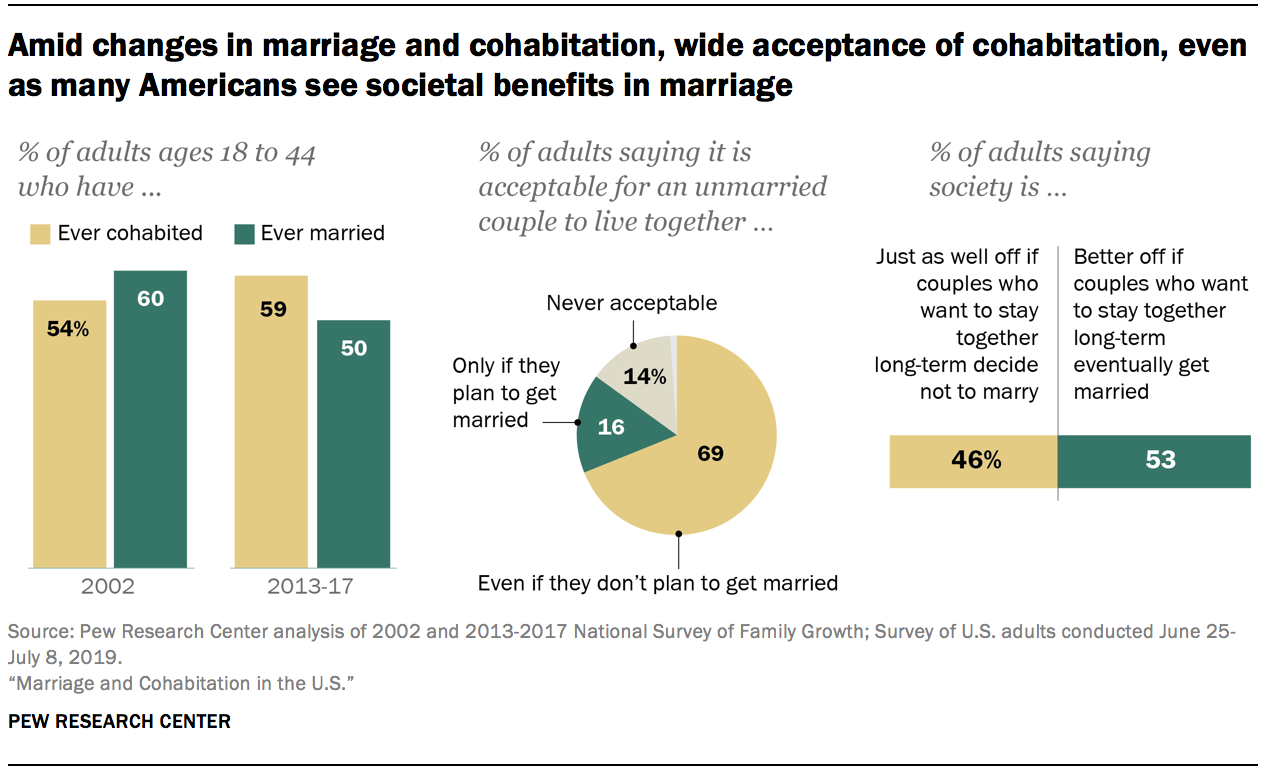
This image is property of www.pewresearch.org.
Considering Legal and Financial Implications
Legal Rights and Protections
Living together before marriage can have implications for legal rights and protections. Unlike marriage, cohabitation does not provide the same legal benefits and protections. It’s important for couples to understand the legal implications of cohabitation, such as property rights, inheritance, and medical decision-making. Seeking legal advice can help ensure that both partners have their rights protected.
Income, Assets, and Property Ownership
Cohabitation involves the merging of finances, assets, and property ownership to varying degrees. Couples living together before marriage should have open and honest conversations about their income, debts, and financial goals. It’s important to establish clear guidelines and expectations regarding joint finances and property ownership.
Tax Considerations
Living together before marriage can have tax implications. Depending on the jurisdiction, unmarried couples living together may have different tax obligations and benefits compared to married couples. It’s important to consult with a tax professional to understand the specific tax considerations and obligations that apply to your situation.
Potential Alimony and Child Support Obligations
In the event of a breakup, unmarried couples living together may still have obligations for alimony and child support, depending on the jurisdiction and individual circumstances. It’s crucial to understand the legal implications and seek legal advice to ensure that both partners are aware of their rights and responsibilities.
Inheritance and Estate Planning
Living together before marriage can raise concerns about inheritance and estate planning. In the absence of legal protections, unmarried partners may face challenges when it comes to inheriting assets or making decisions regarding medical care. It’s vital for couples to engage in estate planning and create legal documents, such as wills and powers of attorney, to protect their interests and wishes.
Prenuptial Agreements
While prenuptial agreements are often associated with marriage, couples living together before marriage can also benefit from a cohabitation agreement or domestic partnership agreement. These legal documents can outline the rights and responsibilities of each partner, provide guidelines for property division in the event of a breakup, and offer financial protection. It’s important to consider the potential benefits of such agreements and consult with legal professionals.
Understanding the Impact on Future Marriage and Divorce
Influence on Marriage Success
Research on the impact of living together before marriage on marriage success has yielded mixed results. Some studies suggest that couples who live together before marriage have a higher risk of divorce, while others find no significant differences in marital outcomes. It’s important for couples to understand that cohabitation does not guarantee or predict the success or failure of a future marriage.
Impact on Divorce Rates
The impact of living together before marriage on divorce rates is a topic of ongoing debate among researchers. Some studies have found a correlation between cohabitation before marriage and higher divorce rates, while others have found no significant difference compared to couples who did not cohabitate before marriage. It’s important to recognize that multiple factors contribute to divorce rates, and cohabitation is just one variable among many.
Effect on Relationship Satisfaction
Living together before marriage may have an effect on relationship satisfaction. Couples who cohabitate before marriage may have a better understanding of each other’s needs, communication styles, and compatibility. This awareness can contribute to higher relationship satisfaction. However, there may also be challenges and conflicts that arise from living together, which can affect satisfaction levels. It’s important for couples to prioritize open communication and work through any difficulties that arise.
Considering Long-Term Commitment
Living together before marriage can serve as a test of long-term commitment. It allows couples to experience the realities of shared living and make informed decisions about their future together. However, it’s crucial for couples to have open and honest discussions about their expectations and intentions regarding marriage and long-term commitment. Living together should not be seen as a substitute for making a conscious commitment to one another.
Potential for Increased Trust and Intimacy
Living together before marriage can provide an opportunity for increased trust and intimacy. Sharing a home allows for greater vulnerability and closeness. Couples can learn to rely on one another, support each other’s goals, and develop a strong emotional bond. This increased trust and intimacy can contribute positively to the overall quality of the relationship.
Lessons Learned from Cohabitation
Living together before marriage offers valuable lessons that can contribute to personal growth and relationship development. Couples can learn about themselves, their partner, and their compatibility through the shared experience of cohabitation. These lessons can inform future decisions and help create a strong foundation for a successful marriage.
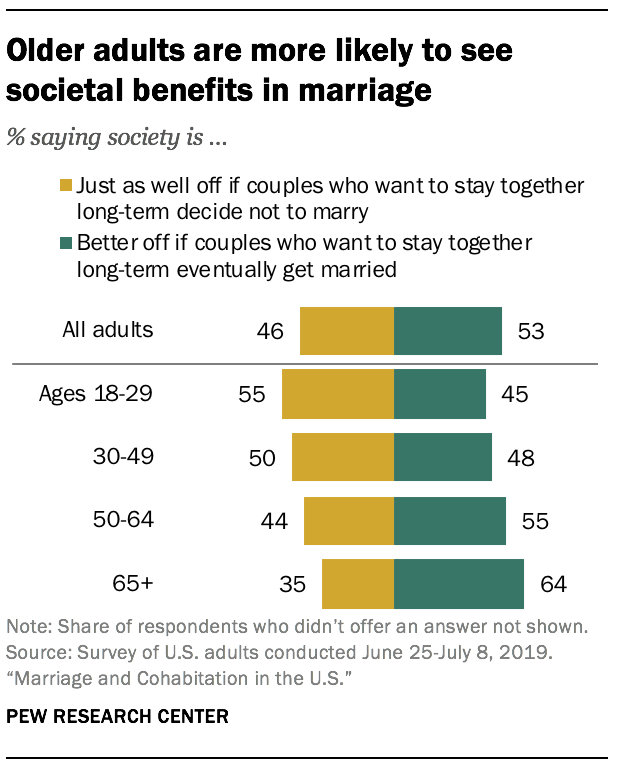
This image is property of www.pewresearch.org.
Exploring Alternative Living Arrangements
Long-Term Partnering without Marriage
Living together before or instead of marriage is just one alternative living arrangement. Some couples may choose to have a long-term partnership without ever getting married. This choice allows for the benefits of companionship, shared responsibilities, and emotional support without the legal or societal expectations of marriage. It’s important for couples to consider their own values, preferences, and long-term goals when deciding on the most suitable living arrangement.
Living Apart Together (LAT) Relationships
Living Apart Together (LAT) relationships are becoming increasingly common. In LAT relationships, couples maintain separate residences while still being in a committed partnership. This arrangement offers the benefits of independence, personal space, and individual pursuits. It can be ideal for couples who prioritize personal autonomy but still want to maintain a loving and committed relationship.
Co-parenting without Romantic Involvement
Some couples may opt for co-parenting without romantic involvement. This arrangement allows for shared parenting responsibilities, joint decision-making, and a focus on the well-being and upbringing of children. Co-parenting without a romantic relationship can be a viable option for individuals who prioritize their children’s welfare and want to maintain a strong parenting partnership.
Polyamorous Relationships
Polyamorous relationships involve consensual and ethical non-monogamy, where individuals have multiple romantic or sexual partners. In such arrangements, individuals may choose to live together with their partners in non-traditional family units. It’s essential for individuals in polyamorous relationships to prioritize open and honest communication, consent, and emotional well-being.
Non-cohabitating Romantic Partnerships
Not all romantic partnerships involve living together. Some couples may choose to maintain separate residences while still being in a committed and loving relationship. Non-cohabitating romantic partnerships offer the benefits of independence, personal space, and individual routines. It’s important for couples to communicate openly about their preferences and ensure that both partners feel fulfilled and supported in the relationship.
Considering Personal Values and Beliefs
Individual Preferences and Comfort Levels
Personal preferences and comfort levels play a significant role in deciding whether to live together before marriage. Each individual has their own unique set of values, beliefs, and desires. It’s important to have open and honest conversations about personal preferences and comfort levels with your partner. Considering and respecting each other’s needs and boundaries is essential for a healthy and fulfilling relationship.
Importance of Personal Autonomy
Personal autonomy is a crucial aspect of any relationship. Each individual deserves the right to make decisions about their own life and well-being. Living together before marriage should be a choice based on personal autonomy, rather than external pressures or expectations. It’s important to prioritize personal autonomy and ensure that both partners feel empowered and respected within the relationship.
Moral and Ethical Considerations
Moral and ethical considerations can vary widely among individuals. Some may have religious or moral beliefs that guide their decisions about living together before marriage. It’s important for couples to have open and respectful conversations about their moral and ethical beliefs and to find a compromise or solution that aligns with both partners’ values.
Religious and Cultural Beliefs
Religious and cultural beliefs can strongly influence an individual’s perspective on living together before marriage. Some religions and cultures discourage or prohibit cohabitation before marriage, while others may be more accepting or provide guidelines for such arrangements. It’s important for individuals to navigate the intersection of religious and cultural beliefs while also considering their own desires and values.
Alignment with Future Goals and Priorities
Living together before marriage should align with couples’ future goals and priorities. It’s important to consider whether cohabitation is consistent with your long-term vision for the relationship and your personal goals. Reflecting on whether living together supports your aspirations for family, career, and personal growth can help inform your decision.
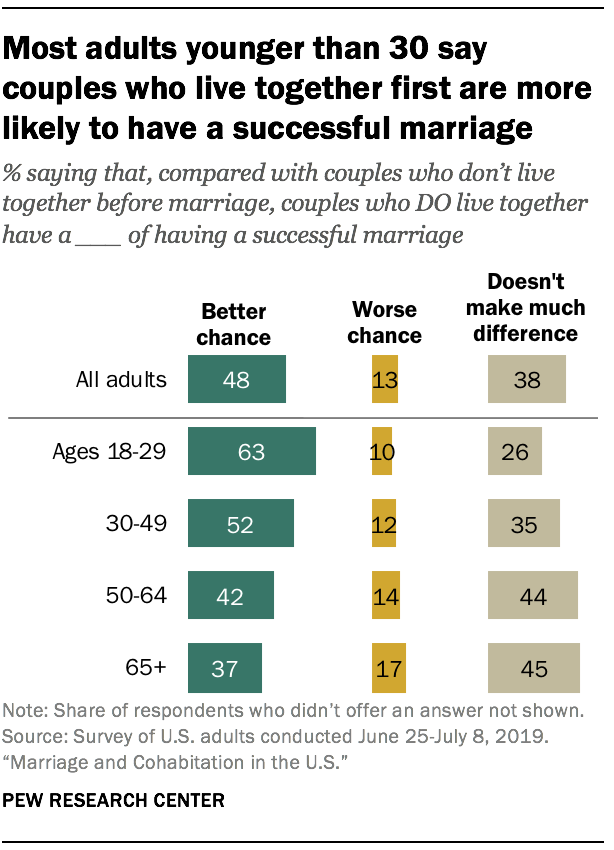
This image is property of www.pewresearch.org.
The Role of Open Communication and Shared Decision Making
Discussing Expectations and Motivations
Open communication is vital in any relationship, particularly when deciding to live together before marriage. Couples should have open and honest discussions about their expectations, motivations, and fears. This communication helps ensure that both partners are on the same page and have a clear understanding of each other’s desires and intentions.
Establishing Relationship Milestones
Living together before marriage represents a significant milestone in a relationship. It’s important for couples to establish their own relationship milestones and celebrate achievements along the way. This can include setting timelines for marriage, discussing future plans, and solidifying commitments. Establishing relationship milestones helps create a sense of progress and shared vision.
Making Informed Decisions Together
Deciding to live together before marriage should be a joint decision made by both partners. It’s important for couples to gather information, discuss their options, and make informed decisions together. Considering the benefits, drawbacks, and implications of cohabitation before marriage can help guide the decision-making process.
Considering the Opinions of Family and Friends
While the ultimate decision rests with the couple, it can be valuable to consider the opinions of family and friends. Loved ones may offer different perspectives and insights that can help inform the decision. However, it’s essential for couples to prioritize their own desires and happiness above external opinions.
Prioritizing Emotional and Mental Well-being
Living together before marriage should prioritize the emotional and mental well-being of both partners. It’s important for couples to check in with each other regularly, prioritize self-care, and seek professional help if needed. Maintaining open lines of communication and prioritizing emotional well-being contributes to a healthy and successful relationship.
Conclusion
Living together before marriage is a personal choice that each couple must consider in light of their own values, beliefs, and circumstances. It offers a unique opportunity to build a stronger foundation, learn about compatibility and shared responsibilities, and make informed decisions about the future. However, it’s important for couples to weigh the potential benefits against the drawbacks, legal and financial implications, and societal expectations. By prioritizing open communication, shared decision-making, and personal well-being, couples can navigate the complexities of living together before marriage and create a fulfilling and successful partnership.






